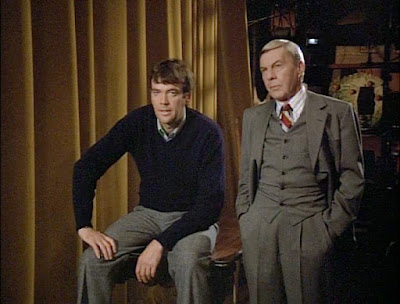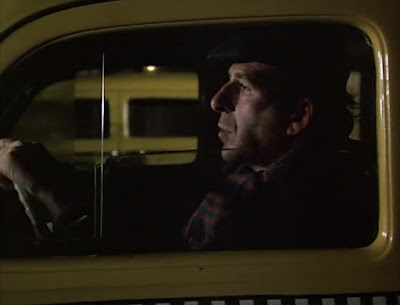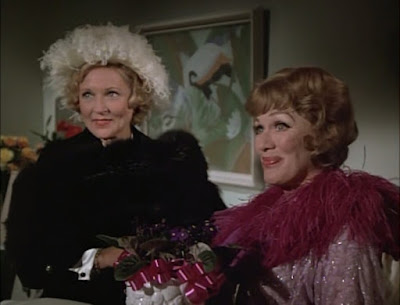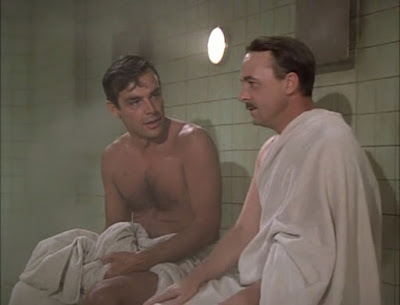First, this post was inspired by Brad Freidman's ongoing series on the 1975-76 Ellery Queen television series over at his Ah Sweet Mystery! blog. Brad started my nostalgia train going and over the last few days I rewatched the first six episodes, which originally aired between September 11 and October 16, 1975. I was only nine years old when the EQ series premiered, but I well remember watching it back in the day.
I don't know whether the idea to watch it was my idea or my parents; we subscribed to TV Guide back then so maybe I stumbled across it in the fall season premieres issue. Back in 1974 I had started reading my Mom's Agatha Christie paperbacks and we had all gone to see Murder on the Orient Express at the movie theater in November, so my mystery antennae were attuned by that point. In fact I would say that the Ellery Queen television series played a pivotal role in my development as a mystery fan, along with dear Agatha and Arthur Conan Doyle, whose Sherlock Holmes stories I read in their entirety in 1977. I thus reached my teenage years as a confirmed mystery fanatic. (Oddly I never actually read Ellery Queen until I was an adult.)
We had watched Peter Falk's Columbo TV series and James Garner's The Rockford Files (my Dad really loved Rockford Files), both of which I enjoyed, but it was the classic puzzle aspect of Ellery Queen that really struck me at the time. The Columbo tales of course were inverted mysteries and to this day inverted mysteries have never appealed to me as much as classic whodunits. In Ellery Queen, there was the man himself, appealingly played by the inevitably "boyish" Jim Hutton (forty-one at the time), turning to the camera near the end of each episode and asking us whether we had solved the mystery like he just had. Who could resist that?
Well, since the series was canceled after just one year, apparently a lot of people could. But I sure couldn't!
 |
| You can't beat a pair of Queens--at least not in this series! (Jim Hutton and David Wayne as Ellery Queen and his Dad) |
I got the DVD set in 2014 and watched the episodes again--with my parents appropriately enough. The only thing I really remembered about the series was that ingratiating ear worm theme song by Elmer Bernstein (Duh-duh! Duh, duh, duh, duuuuh!), which then had been lodged firmly in my head for nearly four decades. Oh, and of course the great relationship between Ellery and his Dad, Inspector Queen, played wonderfully by diminutive, snappish David Wayne.
Some people have debated whether Jim Hutton quite caught the true Ellery, but I don't believe there can be any such doubt about David Wayne's performance in this series.
Looking at the series once again, I have to admit it's cheaper looking than I remembered as a kid. Back then I never noticed how threadbare the sets look and how many of the "office" and "mansion" locations seem basically the same and look like if you shook them they might fall over. (Of course this was true about a lot of Seventies television.) The late killjoy critic Richard Schickel panned the first episode of the series as a "garage-sale period piece," adding deridingly:
[T]he presence of Guy Lombardo, some ancient autos and the oldest of detective story conventions (all suspects are assembled in one room to await the results of the detective's ratiocinations) are supposed to evoke nostalgia. They do not--all the format's stasis is numbing.
Well, speak for yourself, Schickel! I enjoyed the nostalgia then and I enjoy it now, when the nostalgia has weirdly doubled. Back then there was the nostalgia of the classic mystery format, plus the nostalgia of some of the guest star murder victims and suspects, once big American stars back in the day. Look, there's Barbara Rush! Farley Granger! Ida Lupino! Don Ameche! Donald O'Connor! Dina Merrill! Eve Arden! And, yes, Guy Lombardo, who would die two years after he appeared in this series.
 |
| "Taxi!" Herb Edelman dispenses advice to his passenger Ellery Queen |
But now those of us of a certain age and temperament are also nostalgic about people who back then were simply supporting cast staples on American television.
For example, in the first episode, The Adventure of Auld Lang Syne, about a murder at a New Year's Eve ball, when Ellery has to take a taxi to get to the murder scene, who is the cab driver? Why, it's Herb Edelman, a TV fixture for three decades, until his premature death at age 62 in 1996.
Edelman co-starred as well in Neil Simon plays and films like Barefoot in the Park and The Odd Couple, but he is probably best known today as Dorothy's ex-husband in The Golden Girls.
When Inspector Queen checks who the dying man was calling in the phone booth it turns out to be a humble mortician played by George Wyner. Who is that, you ask? Believe me, you know him. (He's still around today, acting, at age 77.)
So if you are into nostalgia, this series certainly is loaded with it. But then so is The Love Boat, which for me, if I go to Hell, is what I will have to watch on TV or tablet every day. (Probably you get tiny, old black and white TV sets in Hell.) Fortunately the Ellery Queen series had murder mysteries. (There should been a film called Death on the Love Boat, or Who Killed Captain Stubing? Certainly someone should have.)
I loved the classic approach of the Auld Lang Syne episode. A hateful millionaire (Thayer David) has gathered his son and various dependents together at a New Year's Party to announce that he's going to disinherit them all. But of course he has! And naturally he tells them he's going to call his lawyer Right Now about it. And naturally he's stabbed to death with a steak knife in the public phone booth. To whom did he place his final phone call? Pay attention, it's a dying clue!
 |
| Don't trust the queen on the right! (David Wayne and Farley Granger) |
Inspector Queen flounders around with his loyal Sergeant Velie (the late Tom Reese, looking made for hard-boiled and noir with his imposing stature and big schnoz), until absent-minded mystery writer Ellery finally gets there to solve the case. (New Year's traffic, don't you know.)
In the meantime we get to enjoy watching the suspects nastily bicker among themselves. Surely the highlights here are Thayer David slagging lovely Joan Collins, playing the sexy gold-digger after his son, and Joan Collins and Farley Granger, playing the drunken and presumably gay nephew, slagging each other liked the snarkiest of rival queens. Great stuff.
Gotta give kudos to Thayer David, who, like a good murder victim should, makes the most of his scene. He was only 48 when he filmed this episode and he looks twenty years older. His "son" in the episode, actor Charles Robinson, was 43! Actors weren't afraid to look old in those days (or the men anyway)--they were character actors, with lots of character. A few years later David would play Rex Stout's Nero Wolfe in what was intended to be series, but he died, at age 51, after filming the pilot.
The second episode, The Adventure of Lover's Leap, has a better mystery plot, all told, but just seemed dramatically inert in comparison. All the actors seemed wasted, including Ida Lupino, knocked off after one scene in the first five minutes that is supposed to be creepy but is just flat, and Don Ameche, playing Ida's psychiatrist. Although we do get Ellery's supreme rival, radio detective Simon Brimmer (the great John Hillerman, with John Houseman one of the best condescending stuffed shirts in the business), who tries to solve the case for himself but totally Hamilton Burgers it.
Of the remaining four of the first half-dozen episodes the stand-outs are The Adventure of the Chinese Dog and The Adventure of Aunt Aggie's Final Performance, eps. 3 and 6.
On the other hand, eps. 4 and 5, The Adventure of the Comic Book Crusader and The Adventure of the Twelfth-Floor Express, both of them with Ellery's other foil, newspaper columnist Frank Flanigan (the late Ken Swofford), seemed forgettable to me. This is despite the latter having a murder in an elevator, always a fun slaying gambit.
TV veteran Ken Swofford is good as brashly obnoxious print newsman Frank Flanigan, but he's just no Simon Brimmer, and even Simon himself could not have saved these two dull episodes.
Fortunately The Chinese Dog and Aunt Aggie are two of the highlights of the series. In Dog Ellery and his Dad have gone fishing in rural Wrightsville, beloved setting of a lot of the actual EQ tales. Naturally they stumble on a mystery! The richest man in town is murdered, bopped on the lead with a bejeweled Chinese temple dog that looks like it was actually purchased at the local five and dime.
I agree with Brad that Wrightsville just comes off as your standard hick town (there's just one establishing shot of what the village actually looks like that I recall, the rest of the scenes taking place inside except for the comic bits at the old fishin' hole); yet it still lends some amusing color to the series. And among the local inhabitants are a county coroner played by Hal Smith, aka The Andy Griffith Show's town drunk Otis, and an oily local pol played by Murray Hamilton, who the same year played the oily local pol who won't close the beach in Jaws, so that's all to the good.
Also to the good is the clever little murder plot, which would have made a nice short story indeed.
 |
| Aunt Aggie and her loyal agent, who has just given her a pot of violets in her room at the hospital, which rather failed to impress (Eve Arden and Betty White) |
Finally, Aunt Aggie is a great deal of fun too. The send-up of Forties radio serials was well-done and the cast in this one quite strong. Aside from the great Eve Arden, in a role, as popular radio star aunt Aggie, that is a send-up of none other than herself, there is the late Betty White as her agent (notice how I'm writing "the late" a lot); John McGiver as the show sponsor (a great character actor who always looked like he was smelling something bad; this was his last performance apparently); darkly handsome Paul Shenar of the seductive velvet voice as the show announcer, who gets a shirtless steam bath scene with Simon Brimmer (yes, he's in this one too, to good effect); and Beatrice Colen as the lovelorn organist. (I immediately remembered her as the roller skating drive-in waitress from Happy Days around this time; she was made for period television.)
Aunt Aggie dramatically gets poisoned during a performance of her radio show. She survives but is knocked off a few days later at the hospital, though not before she has a great scene with Betty White where she looks a bit like the drag queen played by Gene Hackman in The Birdcage. The main plot gambit here is nice, but there's another dying clue, this one pretty risible.
Worse yet Ellery's exposure of it actually manages somehow to extract a confession from the murderer. Someone needs to tell the killers on this series that dying messages are not necessarily legal proof--especially when they are as, um, imaginative as this one.
By episode 6 dying messages had gotten to be a real prop of this series. I don't recall all the later episodes being so dependent on them--at least I hope not! I do recall there were some very good episodes among the later ones. Brad, in fact, has already discussed some of them over at his blog. I'll be tagging along behind, with some more reminiscences about watching this series back in the Seventies too.


My tastes align very much with yours as to the best episodes, but my problem with dying message clues has nothing to do with their legal admissibility, but that these stories rarely go nearly far enough in convincing us that these human beings— who like all other human beings presumably place self-preservation over all other considerations— wouldn’t direct all their final energies toward even the most remote chance to stay alive. If we’re going to change our understanding of human nature for that, we might as well also accept the supernatural and unknown poisons. There are dying message clues that work for me… but they’re not in this series.
ReplyDeleteWell Im more tolerant of the conceit though I will readily concede that Aunt Aggie would hardly have attempted to leave that “message” even if you accept the conceit! I don't mind the occasional dying clue but there have been too many so far!
DeleteI am enjoying this nostalgic lookback from Brad and you on the EQ television series. Like you I was a fanyboy as a teenager in the mid 1970s watching this and I liked Ellery breaking the 4th wall; the arrogance and then comeuppance of Simon Brimmer; the A-, B- and C-list celebrity guest stars; etc. What got me hooked though were the puzzles as there had been few other television examples that focused on the whodunit/howdunit as EQ did.
ReplyDeleteChinese Dog and Aunt Aggie are not the only good episodes, but indeed two of the better ones. Even the weaker episodes are still fun to watch on DVD from time to time.
I don't recall that I actually remembered any of the mysteries decades later, but I did recall the theme song, the great father-and-son relationship (better than The Rockford Files) and the whole way the series embraced the fun artificiality of the mystery genre. Like I said, I had started reading Agatha Christie and the whole thing just engaged my mind tremendously. And has for nearly half a century now!
ReplyDeleteand the whole way the series embraced the fun artificiality of the mystery genre.
DeleteI think that's definitely one of the things that makes this series so much fun. Detective fiction has no business getting mixed up with reality or realism.
That's why I don't object to dying clues. In the real world nobody would ever leave a dying clue. But detective fiction does not take place in the real world.
Of course in the real world no detective would ever encounter an unbreakable alibi which was in fact phoney. No real-life detective has ever had to investigate a locked-room mystery. No actual detective has ever had to ponder an impossible crime.
The other American TV series of that time period that gleefully embraces the artificiality of the genre is Banacek. Every episode an impossible crime.
Even a mediocre episode of the EQ series could keep me from slipping into a terminal state of ennui, the effect which most TV "mysteries" tend to have on me. By the way, "David Thayer" billed himself as "Thayer David," even though his first two names actually were "David Thayer":
ReplyDeletehttps://en.wikipedia.org/wiki/Thayer_David
Whoops, thanks! I wonder why he did that? Of course both can be surnames. Sounds a bit snootier with them reversed, maybe that was the idea!
DeleteBy the way, any chance you have seen David Thayer--I mean Thayer David--in that Nero Wolfe television film? anyone? I would be curious to see that. He seems like he would have been a natural for the role, at least before he lost weight from cancer. I seem to recall William Conrad played him in the early 80s, with Lee Horsley was it as Archie, but I never saw that series.
DeleteI saw the Nero Wolfe telefilm when it was first broadcast, but I can't remember much about it. He made a good mad scientist in JOURNEY TO THE CENTER OF THE EARTH. I can recall more of his DARK SHADOWS work than anything else.
DeleteYes I never saw much DS, was too young, but I remember him. Did he play a Puritan judge at a witch trial, I can sure see it.
DeleteIn Re Thayer David (David Thayer Hersey):
DeleteHe's one of those actors who specialized in playing character who were far older than he was in real life.
On Dark Shadows, David played 10 different characters at different times (never a witch trial judge, though); mainly, he was various members of the Stokes family, from the nearly illiterate 1790s servant Ben Stokes to the erudite Professor Eliot Stokes in the 1960s (those who remember the show will recall this quite well).
In feature films, Thayer David's best-known role was as the fight promoter in the first Rocky movie; had he not died when he did, he might have repeated the role in the sequels, but that's life ...
Irony Dept.: At about the same time as the Nero Wolfe pilot, David appeared in Washington: Behind Closed Doors - playing the J. Edgar Hoover character (recall that the Wolfe pilot was based on The Doorbell Rang).
By the bye: I've noticed that you haven't written up the Ellery Queen pilot film.
Getting to that one later, maybe?
I saw Washington Behind Closed Doors when I was a kid. I think my Mom disapproved but decided it was okay since it was "serious." I recognized Thayer David but hadn't remembered he was in all those things. Definitely a premature death.
DeleteI sometimes think about going back and watching Dark Shadows, must be a hoot, despite the longueurs.
Oh, I want to do the pilot but wanted actually to reread the book first. Still have to do the last four too.
DeleteIf you're on Twitter, @LilyMarsWrites is currently hosting a weekly watch party for Ellery Queen, and it is delightful (we all watch at the same time and tweet each other about the good parts, the actors, the lines, Velie...) It is every Sunday at 6pm Eastern Time, Lily provides a video link for those who don't own the series, and the hashtag to follow is #ElleryQueen75 -- hope to see you there!
ReplyDeleteOh, cool, will try to check out next week.
DeleteThayer David's Nero Wolfe TV movie is on YouTube
ReplyDeletehttps://www.youtube.com/watch?v=0A_U3ykbpDs
The image quality is pretty weak, but you can get the essence.
Good old YouTube!
DeleteI kind of remember watching EQ when it came out. I must be a year older than you, as I would have been 10 in the fall of '75. But I still enjoyed the episodes when I finally got around to watching them again as an adult. Better yet, I knew who all guest stars were this time around, so that made it more enjoyable! I didn't get into comics until I was 13, so I wouldn't have known any better when I first watched it, but it does kind of irritate me how it was handled in the show. If it had been a comic strip instead of a comic book, it would have made a little more sense and I wouldn't have minded so much.
ReplyDeleteI was a comics reader too! As I said I loved the nostalgia of EQ.
Delete